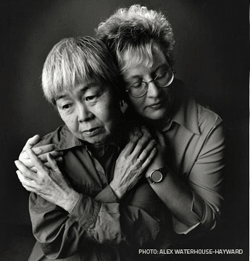“There will always be war but we can rescue each other. There is always giving and foregiveness.”
– Joy Kogawa, Author of “Naomi’s Road”

Naomi’s Road Author Joy Kogawa
with Composer Ramona Luengen
Photo: Alex Waterhouse-Hayward
As a child, Joy Kogawa’s life was uprooted by war. Born in the beautiful coastal town of Vancouver in 1935, she was separated from her parents and sent to an internment camp for Japanese-Canadians along with thousands of others during World War II.
As an adult, Joy Kogawa transformed this painful story of government-sanctioned racism into a semi-autobiographical novel called Obasan (1981), which has been named as one of the most important books in Canadian history by the Literary Review of Canada. In 1986 Kogawa adapted Obasan into a children’s book called Naomi’s Road, which tells the story of the internment through the eyes of a nine-year-old girl named Naomi Nakane.
The books were part of Kogawa’s efforts to educate Canadians about the history of the internment camps, and she was active in the fight to obtain the official apology and repayments from the Canadian government to Japanese-Canadians which were issued in 1988. But many young Canadians are not aware of this sad chapter in their country’s history, in the same way that many U.S. students do not know that over 100,000 Japanese-Americans were sent to internment camps in the U.S. during World War II.
In a bold effort to educate children about racism and injustice at an early age, the Vancouver Opera commissioned an opera for elementary school children based on Naomi’s Road. They commissioned a team of women (a rare occurrence in the opera world) – composer Ramona Luengen, librettist by Ann Hodges, and director Leslie Uyeda – to work with Kogawa to create a 45-minute opera that has now toured to over 150 schools in Canada and the U.S.
At the start of their creative process, the opera team asked Joy Kogawa what she wanted children to learn from the opera. Kogawa’s inspiring answer was, “That there will always be war but we can rescue each other. There is always giving and forgiveness. That war happens, but despite that – children’s gifts can survive.”
 In the story, Naomi and her brother are separated from their parents and sent to an internment camp with their aunt. They encounter racists, bullies and some unexpected friends. At the end of the story, the war has ended but they are being relocated again, since the government sold their home and possessions during the war. The story does not sugar-coat Naomi’s sadness or her brother’s anger, but the children learn that they can survive and provide love and comfort to each other.
In the story, Naomi and her brother are separated from their parents and sent to an internment camp with their aunt. They encounter racists, bullies and some unexpected friends. At the end of the story, the war has ended but they are being relocated again, since the government sold their home and possessions during the war. The story does not sugar-coat Naomi’s sadness or her brother’s anger, but the children learn that they can survive and provide love and comfort to each other.
With a cast of four singers, one pianist and a minimal set, the production is a beautiful example of the way the arts can help people come to terms with their history and heal from deep social wounds. In our violent and war-torn world, Naomi’s Road offers children hope by showing them how music, words, and love can help them survive in difficult circumstances.
You can listen to three excerpts from the opera on composer Ramona Luengen’s website. You can also download the Vancouver Opera’s excellent study guide about the production which includes the libretto, World War II-era pictures of Japanese-Canadians and the camps, pictures of the opera’s set and costumes, statements from the artists and classroom activities. For more information about the touring production of Naomi’s Road, please visit the Vancouver Opera in Schools website.
Note: There is a companion article to this one: Theatre Artist Jude Narita Explodes Asian Stereotypes.
